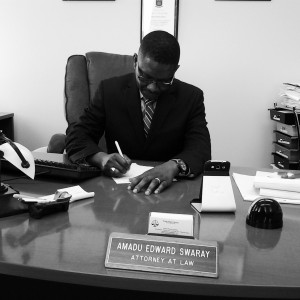
Swaray Law Office building on a bright sunny day.
Residency and physical presence in the United States are among the centerpiece requirements for naturalization in the country. The applicant must reside in the country for the five year period immediately before he files his naturalization application. If married to a United States citizen, he must reside continuously in the United States for the three year period immediately before the date of his application. He must also be physically present in the country for at least 30 months or for two and half years of the five year period immediately before his application.
But if a permanent resident must live outside the United States because of a job with the US Government, private sector or religious organization, and wants to apply for naturalization, he can avoid the residence and physical presence requirements by applying with the Citizenship and Immigration Services (CIS) for preservation of his residency for naturalization. If the CIS approves his application, he can live outside the country as a permanent resident and the period will not be counted against the residency and physical presence requirements of his naturalization application.
The application is filed on a Form N-470, also known as an Application to Preserve Residence for Naturalization purposes. To qualify for the relief, the applicant must first have been physically present and resident in the United States continuously, without absences, for at least one year upon admission as a lawful permanent resident. Religious workers are exempt from this requirement. Second, the applicant must be employed with the United States Government, a private sector or a United States religious organization. One is deemed to be physically present in the United States when the person is within the territorial borders of the United States. One is deemed to be resident in the United States when the person has a principal residence in any part of the country. Examples of principal residences include the ownership by the person of a house, apartment or other of abode type which the person owns or possesses with no immediate intent to abandon while outside the United States. Examples of employment with the United States Government are work with the United States Government under a contract or with an American research institution, firm, corporation or the like. Employment with a public international organization of which the United States is a member by treaty or statute is another example of a job with the United States Government. But the applicant should not have been employed with the public international organization before becoming a lawful permanent president.
Spouses of United States citizens that are eligible for naturalization are exempt from establishing the naturalization residency and physical presence requirements, and therefore, not required to file for preservation of continuous residence. Note that the grant of an application to preserve residence for citizenship does not relieve a permanent resident from obtaining a re-entry permit in advance of trips outside the United States for one year or more. The grant does not also exempt the permanent resident from United States admissibility requirements of his permanent residency status.
This blog is by an attorney at Swaray Law Office in Brooklyn Center, Minnesota. Brooklyn Center is located in the northern suburbs of the Twin Cities. It is north of Minneapolis, Minnesota, and contiguous to Brooklyn Park, Crystal, Robbinsdale, Maple Grove and Blaine. To visit Swaray Law Office, please go to www.swaraylawoffice.com, or call 763-549-0670 or email us at swarayassociates@cs.com.

 Congress created the EB-5 immigrant visa in 1990 with the core purpose of attracting new foreign investment capital to the country, and to create new jobs for United States workers. Since then, the visa program has yielded phenomenal results. By 2008, the program had pumped over $15.4 billion foreign direct investment into the US economy. Between 2010 and 2013, it had injected $9.62 billion, and 29,300 jobs and $12.08 billion in tax revenue.
Congress created the EB-5 immigrant visa in 1990 with the core purpose of attracting new foreign investment capital to the country, and to create new jobs for United States workers. Since then, the visa program has yielded phenomenal results. By 2008, the program had pumped over $15.4 billion foreign direct investment into the US economy. Between 2010 and 2013, it had injected $9.62 billion, and 29,300 jobs and $12.08 billion in tax revenue.